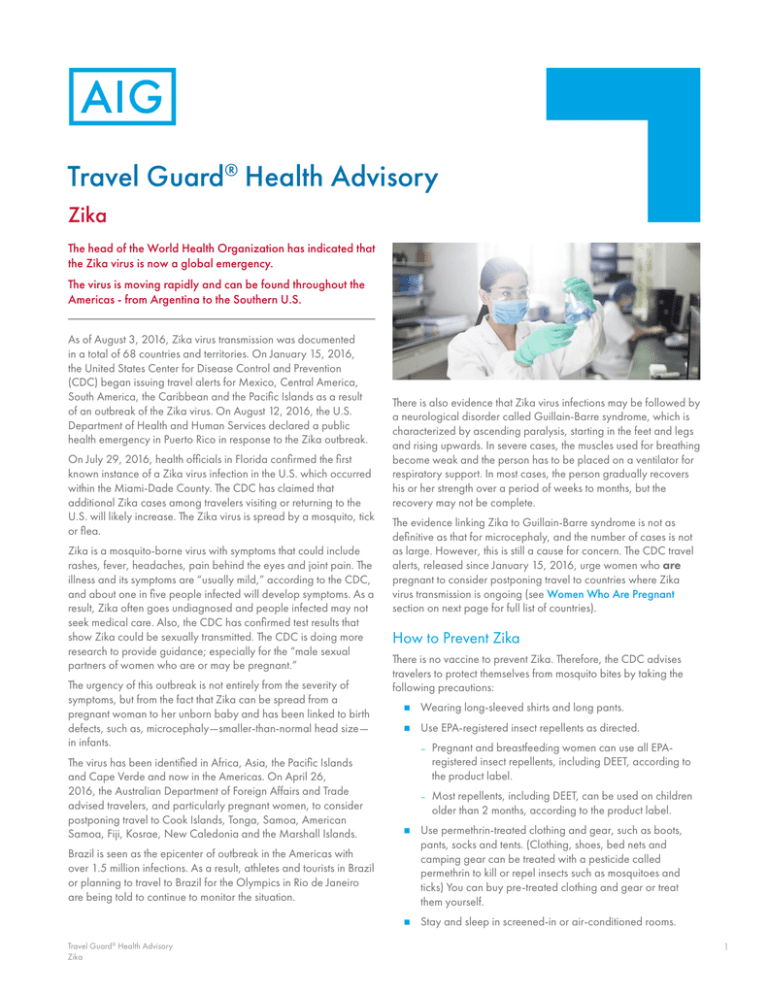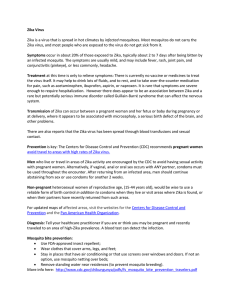
Travel Guard® Health Advisory
Zika
The head of the World Health Organization has indicated that
the Zika virus is now a global emergency.
The virus is moving rapidly and can be found throughout the
Americas - from Argentina to the Southern U.S.
As of August 3, 2016, Zika virus transmission was documented
in a total of 68 countries and territories. On January 15, 2016,
the United States Center for Disease Control and Prevention
(CDC) began issuing travel alerts for Mexico, Central America,
South America, the Caribbean and the Pacific Islands as a result
of an outbreak of the Zika virus. On August 12, 2016, the U.S.
Department of Health and Human Services declared a public
health emergency in Puerto Rico in response to the Zika outbreak.
On July 29, 2016, health officials in Florida confirmed the first
known instance of a Zika virus infection in the U.S. which occurred
within the Miami-Dade County. The CDC has claimed that
additional Zika cases among travelers visiting or returning to the
U.S. will likely increase. The Zika virus is spread by a mosquito, tick
or flea.
Zika is a mosquito-borne virus with symptoms that could include
rashes, fever, headaches, pain behind the eyes and joint pain. The
illness and its symptoms are “usually mild,” according to the CDC,
and about one in five people infected will develop symptoms. As a
result, Zika often goes undiagnosed and people infected may not
seek medical care. Also, the CDC has confirmed test results that
show Zika could be sexually transmitted. The CDC is doing more
research to provide guidance; especially for the “male sexual
partners of women who are or may be pregnant.”
The urgency of this outbreak is not entirely from the severity of
symptoms, but from the fact that Zika can be spread from a
pregnant woman to her unborn baby and has been linked to birth
defects, such as, microcephaly—smaller-than-normal head size—
in infants.
The virus has been identified in Africa, Asia, the Pacific Islands
and Cape Verde and now in the Americas. On April 26,
2016, the Australian Department of Foreign Affairs and Trade
advised travelers, and particularly pregnant women, to consider
postponing travel to Cook Islands, Tonga, Samoa, American
Samoa, Fiji, Kosrae, New Caledonia and the Marshall Islands.
There is also evidence that Zika virus infections may be followed by
a neurological disorder called Guillain-Barre syndrome, which is
characterized by ascending paralysis, starting in the feet and legs
and rising upwards. In severe cases, the muscles used for breathing
become weak and the person has to be placed on a ventilator for
respiratory support. In most cases, the person gradually recovers
his or her strength over a period of weeks to months, but the
recovery may not be complete.
The evidence linking Zika to Guillain-Barre syndrome is not as
definitive as that for microcephaly, and the number of cases is not
as large. However, this is still a cause for concern. The CDC travel
alerts, released since January 15, 2016, urge women who are
pregnant to consider postponing travel to countries where Zika
virus transmission is ongoing (see Women Who Are Pregnant
section on next page for full list of countries).
How to Prevent Zika
There is no vaccine to prevent Zika. Therefore, the CDC advises
travelers to protect themselves from mosquito bites by taking the
following precautions:
Wearing long-sleeved shirts and long pants.
Use EPA-registered insect repellents as directed.
Pregnant and breastfeeding women can use all EPAregistered insect repellents, including DEET, according to
the product label.
––
Most repellents, including DEET, can be used on children
older than 2 months, according to the product label.
Use permethrin-treated clothing and gear, such as boots,
pants, socks and tents. (Clothing, shoes, bed nets and
camping gear can be treated with a pesticide called
permethrin to kill or repel insects such as mosquitoes and
ticks) You can buy pre-treated clothing and gear or treat
them yourself.
Stay and sleep in screened-in or air-conditioned rooms.
Brazil is seen as the epicenter of outbreak in the Americas with
over 1.5 million infections. As a result, athletes and tourists in Brazil
or planning to travel to Brazil for the Olympics in Rio de Janeiro
are being told to continue to monitor the situation.
Travel Guard® Health Advisory
Zika
––
1
If You Think You May Have Zika
References
Please note, there is no specific medical treatment for Zika.
Centers for Disease Control and Prevention, CDC
Talk to your doctor or nurse if you develop a fever with a
rash, joint pain or red eyes. Tell him/her about your recent
travel.
World Health Organization, WHO
Australian Government - Department of Foreign Affairs and
Trade
U.S. Public Health Emergency, PHE
Your doctor or healthcare professional may recommend
taking medicine, such as acetaminophen or paracetamol,
to relieve fever and pain. Do not take aspirin, products
containing aspirin, or other nonsteroidal anti-inflammatory
drugs such as ibuprofen.
Your doctor or healthcare professional may likely
recommend getting plenty of rest and drinking of liquids.
Women Who Are Pregnant
Consider postponing travel to any area where Zika virus
transmission is ongoing: American Samoa, Anguilla, Antigua,
Argentina, Aruba, Barbados, Barbuda, Belize, Brazil, Bolivia,
Bonaire, Cape Verde, Cayman Islands, Colombia, Costa Rica,
Cuba, Curacao, Dominica, Dominican Republic, Ecuador,
El Salvador, Fiji, French Guiana, Grenada, Guadeloupe,
Guatemala, Guyana, Haiti, Honduras, Jamaica, Kosrae
(Federated States of Micronesia), Marshall Islands, Martinique,
Mexico, New Caledonia, Nicaragua, Papua New Guinea,
Panama, Paraguay, Peru, Puerto Rico, Saba, Saint Barthelemy,
Saint Lucia, Saint Martin, Saint Vincent and the Grenadines,
Samoa, Sint Eustatius, Sint Maarten, Suriname, Tonga, Trinidad
and Tobago, Turks and Caicos, the U.S. Virgin Islands and
Venezuela.
Women Who Are Trying to Become Pregnant
Before you travel, talk to your doctor about the risk of Zika
virus infection.
It is strongly recommended that you follow the steps to
prevent mosquito bites during your trip.
About AIG Travel and Travel Guard®
AIG Travel, Inc., a member of American International Group,
Inc., is a worldwide leader in travel insurance solutions and
assistance. Travel Guard® is the marketing name for its portfolio
of travel insurance solutions and travel-related services, including
assistance and security services, marketed to both leisure and
business travelers around the globe. Services are provided through
a network of wholly owned service centers located in Asia, Europe
and the Americas. For additional information, please visit our
websites at www.aig.com/travel and www.travelguard.com.
About AIG
American International Group, Inc. (AIG) is a leading global
insurance organization serving customers in more than 100
countries and jurisdictions. AIG companies serve commercial,
institutional, and individual customers through one of the most
extensive worldwide property-casualty networks of any insurer. In
addition, AIG companies are leading providers of life insurance
and retirement services in the United States. AIG common stock
is listed on the New York Stock Exchange and the Tokyo Stock
Exchange.
Additional information about AIG can be found at www.aig.com
| YouTube | Twitter @aiginsurance | LinkedIn
With no ecological or epidemiological barriers to halt it, it is likely
that Zika virus will continue to spread in the Americas to those
countries where the vector mosquito is present – those localities
that regularly have dengue and chikungunya outbreaks. AIG
Travel will continue to document its progress as it occurs.
This product is confidential and for use only by the intended recipient(s). It cannot be distributed by the aforementioned recipients, to any other parties, without the
prior express consent of AIG Travel. AIG Travel will use reasonable endeavors to ensure the accuracy of information contained herein as of the date this product is
time stamped but all such information, given its nature, shall be subject to change or alteration at any time and the use of such information is at the sole discretion
of the intended recipient(s). AIG Travel assumes no liability or responsibility for the use, interpretation or application of any of the information contained herein.
The information contained in this material is for general informational purposes and is not intended as a substitute for professional medical advice, diagnosis or
treatment. Always seek the advice of your physician or other qualified health provider with any questions you may have regarding a medical problem. For reprints
or digital reproduction rights, please contact: worldwidemarketing@aig.com.
© 2016 American International Group, Inc. All rights reserved.
Travel Guard® Health Advisory
Zika
2



